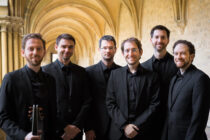Christ Church Cathedral
Profeti della Quinta, ensemble
Profeti della Quinta has had to cancelled their tour due to the rising cases of Covid 19. We look forward to when they’ll be able to perform with us in the future.
The singers of Profeti della Quinta and the bassist and composer Elam Rotem specialize in music from the Baroque and Renaissance periods. They are dedicated primarily to the rediscovery of Hebrew vocal music – great works that are often very much overshadowed by the popular klezmer tradition in Jewish heritage in this country. The Madrigal was the most prominent genre of secular vocal music in the Renaissance and early Baroque periods. This program follows its evolution from the highly expressive polyphony of Cipriano de Rore, to the revolutionary madrigals by Claudio Monteverdi that shaped the Baroque era.
“…This expertly performed collection of Italian madrigals, Hebrew prayers and instrumental music deserves recognition as a hidden gem.”
This concert is generoulsy supported by Sharon Kahn & Barry MacFadden, Birgit Westergaard & Norman Gladstone.
Purchasing Tickets
Tickets are no longer available.
Programme
Luzzascho Luzzaschi (1545–1607)
Io veggio pur pietate
Morir non puo’l mio core
Cipriano de Rore (ca. 1515-1565)
Ancor che col partire
Datemi pace
Alessandro Piccinini (1566-1638)
Toccata III. Chromatica
Luzzascho Luzzaschi
Deh, non cantar
Quivi sospiri
Carlo Gesualdo (1566-1613)
Occhi, del mio cor vita
Scipione Lacorcia (1590-1620)
Ahi, tu piangi
Girolamo Kapsberger (1566-c.1638)
Passacaglia
Claudio Monteverdi (1567-1643)
Lamento della ninfa
Elam Rotem (1984 – Present)
Aní yeshenáh velibí er
Claudio Monteverdi (1567 – 1643)
Lamento d’Arianna
Elam Rotem (1984 – Present)
Ballo del Granduca (improvisation)
Claudio Monteverdi (1567 – 1643)
Bel Pastor
Zefiro torna e’l bel tempo rimena
Texts & Translations
To view/download texts & translations for this concert, click here.
Programme Notes
The program takes the listener on a journey back in time and place to Italy of the 16th and early 17th centuries, following the secular vocal genre of the Madrigal. The Italian Madrigal was artistically one of the most important musical genres of the Renaissance, in which composers were able to freely experiment with new musical means to express the text, means that would not have been appropriate or even permitted in motets or masses. The novel expression of the poetry and its affects, initiated in the Madrigals of Cipriano de Rore (ca. 1515-1565) and later known as seconda prattica, paved the way to the formation of a new musical language and to the first operas.
We thus begin with Cipriano de Rore, il divino, whose Madrigals balance the Renaissance ideal of pure sound beauty with new experimental ways of expressing the poetry. De Rore’s setting of Petrarch’s sonnet Datemi pace, is a fine example of his extraordinary musical language: beautiful, surprising and at points bizarre, even for a modern listener. De Rore was the musical father of many important composers in the generations to come, for example of Luzzasco Luzzaschi (ca. 1545-1607), active in the court of Ferrara, one of the leading courts in Renaissance Italy in the fields of music and poetry. Luzzaschi studied with de Rore as a young man and continued to explore the latter’s novel musical ideas. This can be clearly heard in Luzzaschi’s Quivi sospiri, a rare example of musical setting from Dante’s Divine Comedy.
Don Carlo Gesualdo (1560-1613), a nobleman and self-made composer, studied for a time with Luzzaschi. Gesualdo was described by his contemporaries as “madly obsessed with music”, and a certain touch of madness is quite evident in his chromatic and avant-garde Madrigals. They express the poetry very effectively, sometimes at the expense of sheer musical beauty. Gesualdo was not the only composer employing this kind of extreme musical means, but rather a member of a circle of composers who stretched the madrigal genre in a specifically mannerist way. An almost unknown composer of the same school is Scipione Lacorcia (1585?-1620?), who ventured even further than Gesualdo. The madrigal Ahi, tu piangi might lead the listeners to believe that it is a piece composed in the 20 th century. The pace at which Lacorcia allows himself to jump between extremely foreign harmonies is truly shocking.
The pieces by Claudio Monteverdi (1567-1643) show how the Madrigal genre was transported under his hands into the realm of musical drama. Most striking are the two lamenti by Monteverdi: the epic Lamento d’Arianna, the only surviving excerpt from his lost opera L’Arianna which the composer himself arranged for five voices and basso continuo; and the famous Lamento della Ninfa, which could have easily been an operatic scene depicting an abandoned maiden.
We included also one piece by Elam Rotem, who uses in his compositions the musical language of the early 17th century. The piece is a setting of text from the Song of Songs, describing a lost girl looking for her lover, not unlike in the Lamenti of Monteverdi.
- Elam Rotem

Profeti della Quinta, ensemble
Ensemble Profeti Della Quinta focuses on the vocal repertoire of the 16th and early 17th centuries. They create vivid and expressive performances for audiences today while considering period performance practices. From its core of five male singers, the ensemble collaborates regularly with instrumentalists and guest singers. Their programmes range from explorations of the Italian madrigal to seldom-heard Jewish sacred music and more. In 2011 the ensemble won the York Early Music Young Artists Competition and has since performed in Europe, Israel, North America, China and Japan.They have released 10 albums on the Pan Classics, tiroler landes museen, Glossa, and LINN labels. Originally from the Galilee region of Israel, the group is now based in Basel, Switzerland, where they regularly collaborate with the Schola Cantorum.


